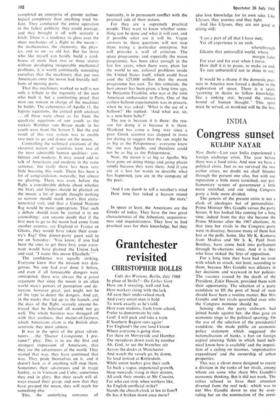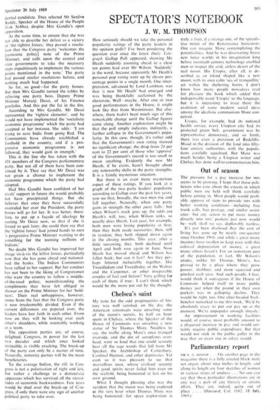INDIA
Congress sunset
KULDIP NAYAR
New Delhi—Last year India experienced a foreign exchange crisis. The year before
there was a food crisis. And now we have a political crisis. Just as we survived 'the two earlier crises, no doubt we shall blunder through the present one also, but with our reputation a little more tarnished, our par- liamentary system of government a little more stretched, and our ruling Congress party a little more divided.
The genesis of the present crisis is not a clash of ideologies but of personalities: Prime Minister Mrs Gandhi versus the party bosses. It has looked like coming for a long time, indeed from the day she became the Prime Minister after the 1967 elections. At that time her rivals in the Congress party were in disarray, because many of them had lost at the polls. Some, like Mr K. Kamaraj from Madras and Mr S. K. Patil from Bombay, have come back into parliament through by-elections since. And it is they who have stoked the fires of opposition.
For a long time they have had no issue with which to attack, not least, according to them, because Mrs Gandhi was dilatory in her decisions and wayward in her policies. The vacancy caused by the death of the President, Zakir Husain, provided them with their opportunity. The selection of a party candidate to fill the post of head of state should have been a routine matter. But Mrs Gandhi and her rivals quarrelled over who the Congress nominee should be.
Sensing that the party stalwarts had joined hands against her, she thus gave an economic tinge to the political sparring. On the eve of the selection of the presidential candidate, she made public an economic policy statement which suggested the nationalisation of banks, a ban on foreign capital entering 'fields in which local tech- nical know-how is available' and the imposi- tion of a ceiling on incomes, 'unproductive expenditure' and the ownership of urban properties.
This was a clever move designed to create a division in the ranks of her rivals, among whom are some who share Mrs Gandhi's economic thinking. But it did not work. The critics refused to have their attention diverted from the real task: which was to cut' Mrs Gandhi down to size by over- ruling her on the nomination of the presi-
dential candidate. They selected Mr Sanjiva Reddy, Speaker of the House of the People (Lok Sabha), despite Mrs Gandhi's open opposition.
At the same time, to ensure that she was not able to describe her defeat as a victory of 'the rightist forces,' they passed a resolu- tion that the Congress party 'welcomes the [economic policy] note of the Prime Minister, and calls upon the central and state governments to take the necessary steps expeditiously to implement the various points mentioned in the note.' The party had passed similar resolutions before, and nothing much had happened.
So far, so good—for the party bosses. But then Mrs Gandhi turned the tables by relieving one party boss, Deputy Prime Minister Morarji Desai, of his Finance portfolio. And this put the fat in the fire.
According to Mrs Gandhi, Mr Desai represented the 'rightist elements', and he would not have implemented the 'socialistic economic programme' which the party had accepted at her instance. She adds: 'I am trying to save India from going Red. The Communists have already established a foothold in the country, and if a pro- gressive economic programme is not followed, they would gain in strength.'
This is the line she has taken with the 431 members of the Congress parliamentary party. But not all of them have been con- vinced by it. They say that Mr Desai was not given a chance to implement the economic programme which the party had adopted, Had Mrs Gandhi been confident of her rivals' support in future she would probably not have precipitated things. But she believes that once they have successfully overruled her over the President, the party bosses will go for her. It was better, there- fore, to put up a façade of ideology by ousting Mr Desai now, so that if she is forced to quit later, she could then say that the 'rightist forces' had joined hands to oust 'a progressive Prime Minister wanting to do something for the teeming millions of Indians.'
No doubt Mrs Gandhi has improved her image vis-à-vis the leftist forces, particularly now that she has gone ahead and national- ised the banks. The Indian Communists have rallied to her support. But her conduct has not been to the liking of Congressmen who want the country to follow a middle- of-the-road policy, notwithstanding the compliments they have felt obliged to shower on the Prime Minister for her 'bold- ness'. Their real unhappiness, however, stems from the fact that the Congress party is now irredeemably divided. Even if the current differences are papered over, the leaders have lost faith in each other. From now on they will be looking over each other's shoulders, while ostensibly working as a team.
The opposition parties are, of course, delighted. Congress, in power for the last two decades and which once looked invincible, is visibly cracking. The break-up of the party can only be a matter of time. Naturally, minority parties will be the main beneficiaries.
To the average Indian, the rift in Con- gress is not a polarisation of right and iert, but rather a challenge to a democratic apparatus which has survived all the vicissi- tudes of economic backwardness. Few tears would be shed over the break-up of Con- gress, if only there were any sign of another political party to take over.



































 Previous page
Previous page